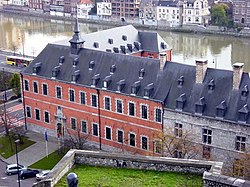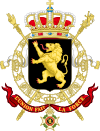
Walloons are a Gallo-Romance ethnic group native to Wallonia and the immediate adjacent regions of Flanders, France, Germany, Luxembourg and the Netherlands. Walloons primarily speak langues d'oïl such as Belgian French, Picard and Walloon. Walloons are primarily Roman Catholic, with a historical minority of Protestantism which dates back to the Reformation era.

The politics of Belgium take place in the framework of a federal, representative democratic, constitutional monarchy. The King of the Belgians is the head of state, and the prime minister of Belgium is the head of government, in a multi-party system. Executive power is exercised by the government. Federal legislative power is vested in both the government and the two chambers of parliament, the Senate and the Chamber of Representatives. The federation is made up of (language-based) communities and (territorial) regions. Philippe is the seventh and current King of the Belgians, having ascended the throne on 21 July 2013.

Wallonia, officially the Walloon Region, is one of the three regions of Belgium—along with Flanders and Brussels. Covering the southern portion of the country, Wallonia is primarily French-speaking. It accounts for 55% of Belgium's territory, but only a third of its population. The Walloon Region and the French Community of Belgium, which is the political entity responsible for matters related mainly to culture and education, are independent concepts, because the French Community of Belgium encompasses both Wallonia and the bilingual Brussels-Capital Region but not the German-speaking Community of Belgium.

The Parliament of the Brussels-Capital Region is the governing body of the Brussels-Capital Region, one of the three regions of Belgium. It is also known as the Brussels Regional Parliament.

"The Song of the Walloons" is the regional anthem of Wallonia in Belgium. The original lyrics were written by Théophile Bovy in 1900 in the Walloon language. A year later, it was set to music composed by Louis Hillier. Performed for the first time in the city of Liège, the song quickly spread to other parts of French-speaking Belgium and established itself like a "national" anthem for Wallonia.
The politics of Wallonia concern the government of Wallonia, that is the southern Region of Belgium.
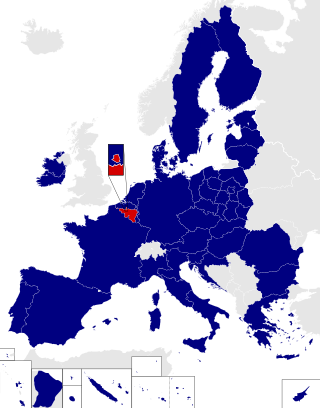
The French-speaking electoral college is one of three constituencies of the European Parliament in Belgium. It currently elects 8 MEPs using the D'Hondt method of party-list proportional representation. It elected 9 MEPs until the 2007 accession of Bulgaria and Romania.

The Kingdom of Belgium has three official languages: Dutch, French, and German.
The 2007–2008 Belgian government formation followed the general election of 10 June 2007, and comprised a period of negotiation in which the Flemish parties Flemish Liberal Democratic, Christian Democratic and Flemish (CD&V) and New Flemish Alliance (N-VA), and the French-speaking parties Reformist Movement (MR), Democratic Front of Francophones (FDF) and Humanist Democratic Centre (CdH) negotiated to form a government coalition. The negotiations were characterized by the disagreement between the Dutch- and French-speaking parties about the need for and nature of a constitutional reform. According to some, this political conflict could have led to a partition of Belgium.

The Cabinet of the French Community of Belgium is the executive branch of the French Community of Belgium, and it sits in Brussels. It consists of a number of ministers chosen by the Parliament of the French Community and is headed by a Minister-President.
The partition of Belgium is a hypothetical situation, which has been discussed by both Belgian and international media, envisioning a split of Belgium along linguistic divisions, with the Flemish Community (Flanders) and the French-speaking Community (Wallonia) becoming independent states. Alternatively, it is hypothesized that Flanders could join the Netherlands and Wallonia could join France or Luxembourg.

The government of the Brussels-Capital Region is the political administration of the Brussels-Capital Region of Belgium. An election is held every five years. The government is headed by a Minister-President, four ministers and three state secretaries.

The Walloon Government or Government of Wallonia is the executive branch of Wallonia, and it is part of one of the six main governments of Belgium. It sits in Namur, where the Parliament of Wallonia is seated as well.

The Belgian provincial, municipal and district elections of 2012 took place on 14 October. As with the previous 2006 elections, these are no longer organised by the Belgian federal state but instead by the respective regions:

The Di Rupo Government was the federal cabinet of Belgium sworn in on 6 December 2011, after a record-breaking 541 days of negotiations following the June 2010 elections. The government included social democrats (sp.a/PS), Christian democrats (CD&V/cdH) and liberals, respectively of the Dutch and French language groups. The government notably excluded the New Flemish Alliance (N-VA), the Flemish nationalist party which achieved a plurality and became the largest party. Its absence, together with the unwillingness of Open Vld to enter into an eight-party coalition that included the green parties, caused the government coalition to lack a majority in the Dutch language group. It was the first time that the Belgian prime minister had been openly gay, as Di Rupo became the world's first male openly gay head of government. Elio Di Rupo also became the first native French-speaking prime minister since 1979 and the first prime minister from Wallonia since 1974 and first socialist prime minister since 1974.
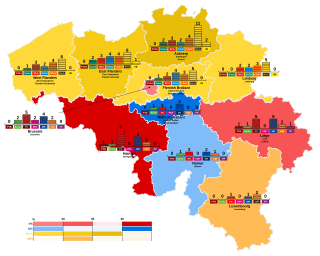
Federal elections were held in Belgium on 25 May 2014. All 150 members of the Chamber of Representatives were elected, whereas the Senate was no longer directly elected following the 2011–2012 state reform. These were the first elections held under King Philippe's reign.
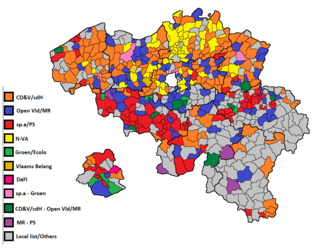
The Belgian provincial, municipal and district elections of 2018 took place on Sunday 14 October 2018. They are organised by the respective regions:
In the run up to the 2019 Belgian federal election, various organisations carry out opinion polling to gauge voting intention in Belgium. Results of such polls are displayed in this article.

Federal elections were held in Belgium on 9 June 2024. The Chamber of Representatives received 150 members with five-year terms. European and regional elections took place on the same day.


